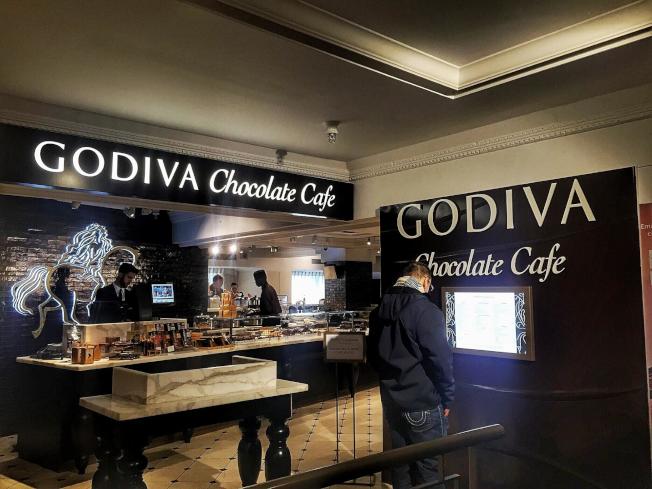Godiva Godivan sells part of his business and wants to open a coffee shop! Coffee is easier to earn than chocolate?
Professional coffee knowledge exchange More coffee bean information Please pay attention to coffee workshop (Weixin Official Accounts cafe_style)
On February 20, Godiva, the Belgian chocolate brand known as the Rolls-Royce of chocolate, announced that it would sell part of its Asia-Pacific business to MBK Partners (MBK), a South Korean private equity firm, to obtain more funds for further expansion, including accelerating investment in emerging and existing markets, and supporting Godiva's plan to open more than 2000 cafes worldwide.

Repayment of $6.5 billion debt
The deal involves Japan, South Korea, Australia and new Zealand. Godiva's packaged food, e-commerce sales, travel retail businesses, more than 300 retail stores and a chocolate factory in Brussels, Belgium, serving Asian markets will all be sold to MBK, but brand ownership will remain with Godiva. The deal is expected to close in mid-2019, with Reuters saying it is expected to be worth between $1 billion and $1.5 billion.
The deal will help Godiva's parent company, Yildiz, pay off some of its $6.5 billion in short-term debt accumulated in the past, giving it more money to expand further. In 2008, Turkish conglomerate Yildiz bought Godiva from Campbell Soup for $850 million. Although Yildiz has not disclosed Godiva's financial figures, it has previously said Godiva's revenue exceeded $1 billion in 2017 and was largely driven by Asian markets, with Japan's Godiva revenue reaching $350 million at one point.

2000 new coffee shops
In addition to debt repayment, the proceeds from the sale of some of Godiva's Asia Pacific businesses will be used to expand Godiva's coffee shop business.
Godiva announced its foray into the coffee shop chain market at the end of 2018, expanding in a more aggressive way. CEO Annie Young-Scrivner said the company plans to open 2000 new Godiva coffee shops over the next six years, growing further in existing and emerging markets at five times the rate of the past-with the goal of increasing revenue by five times in 2024 compared to 2018. At the time, they were approaching private equity and fund companies seeking to sell their businesses. "We need more money to do these things," Young-Scrivner said.
Godiva's coffee shop standards will be between 140 square meters and 240 square meters. From the menu so far announced, Godiva Coffee may be distinguished from other coffee chains by more chocolate-related sweets. It sells hot chocolate, chocolate-covered strawberry snacks, cookies, Afgardo coffee and more. Among them, chocolate strawberries, ice cream and hot chocolate have been sold in retail stores earlier.
It is reported that Godiva's coffee beans use its chocolate-making aroma technology, which will have a special flavor; the coffee sold in the store can be added to Godiva's high-quality chocolate, which may be more delicious than the mocha drunk in other stores... These may appeal more to the average coffee lover.

Is coffee really better than chocolate?
Godiva's interest in the coffee and tea chain is justified. From sweet to bitter, Godiva isn't whimsical, perhaps because coffee and chocolate share a common friend-caffeine. As early as 2010, Godiva began experimenting with coffee business, opening more than 40 cafes in Istanbul, Shanghai and other cities, selling products including coffee and hot chocolate. Although there have been early attempts, the competition in the coffee market cannot be underestimated by Godiva. Global coffee consumption has grown steadily, and the world's packaged food and beverage giants have shown strong interest in coffee business in the past few years: Coca-Cola bought Costa Coffee for $5.1 billion last year, and Nestle paid $7.15 billion for part of Starbucks 'packaged coffee and beverage business.
The excitement of the coffee market contrasts with the weakness of the chocolate market. According to Euromonitor, the global coffee market exceeded $80 billion in 2016. However, according to Euromonitor's survey, as consumers pay more attention to healthy snacks, the performance of sweet food companies has been hit hard in recent years, with global sales falling successively from 2015 to 2016. Although revenue rebounded in 2017, it was mainly affected by fluctuations in cocoa prices.

Coffee shops aren't just about selling coffee.
Many large beverage companies see coffee as an important area to fortify their product portfolios. For Godiva, this is not just about adding a coffee business line, but also providing an opportunity to achieve profit targets at multiple prices and packaging types, building a luxury brand image from coffee bags to high-end coffee shops.
Chocolate as an opportunity for consumers to spend more money in stores is Godiva's next growth point. "We make chocolate. Lately we've been thinking: What can we do in that next category?" "Coffee, tea and chocolate complement each other," Young-Scrivner said."Then we retain Belgian tradition, quality and craftsmanship, and it is possible to enter the baking business in the future."
Since Godiva entered the Chinese market in 2009, it has been deployed in more than 20 cities and has more than 100 franchised stores. According to a report in the English edition of China Daily in 2017, Godivan's revenue in China is expected to be US $140 million that year, surpassing the Japanese market to about US $300 million by 2020, and opening 300 stores in China.

At present, Godiva has about 40 coffee shops around the world, including one in Shanghai; in the future, it will expand mainly in first-tier cities such as New York, with one-third of its stores in North America, one-third in Asia and the rest in other markets. Industry analysts believe that the Chinese market will be one of the key points in Godiva's plan to open cafes in Asia. "China's chocolate market will be nearly 22 billion yuan in 2018, and this big cake is undoubtedly attractive to Godiva."
Part of the article refers to: interface news, billion euro network, etc.
Image Source: Network
END
Important Notice :
前街咖啡 FrontStreet Coffee has moved to new addredd:
FrontStreet Coffee Address: 315,Donghua East Road,GuangZhou
Tel:020 38364473
- Prev

Why does coffee taste sour? Why is the coffee you drink sour?
For information, please follow the coffee workshop (Wechat official account cafe_style) the word coffee coffee (Coffee) comes from a small town in Ethiopia called kaffa, and in Greek Kaweh means strength and enthusiasm. Tea, coffee and cocoa are called the three major drinks in the world. Coffee tree is a small evergreen tree of Rubiaceae, found in tropics and subtropics.
- Next

Coffee brewing champion Wang ze's way to win the championship. What's so special about Wang ze's cafe?
For more information on coffee beans, please follow the coffee workshop (Wechat official account cafe_style). If you talk about the history of coffee in Taiwan, you have to go back to the 10th year of Guang Xu in the Qing Dynasty (AD 1884), which was the first year of coffee cultivation in Taiwan. It was not planned for large-scale cultivation until the Japanese occupation era (1935). Drink as you drink
Related
- What brand of black coffee is the most authentic and delicious? what are the characteristics of the flavor of the authentic Rose Summer Black Coffee?
- Introduction to the principle and characteristics of the correct use of mocha pot A detailed course of mocha pot brewing coffee is described in five steps.
- Which is better, decaf or regular coffee? how is decaf made?
- How much is a bag of four cat coffee?
- How about four Cat Coffee or Nestle Coffee? why is it a cheap scam?
- Which is better, Yunnan four Cats Coffee or Nestle Coffee? How about cat coffee? is it a fake scam? why is it so cheap?
- How about Cat Coffee? what grade is a hoax? which instant coffee tastes better, four Cat Coffee, Nestle Coffee or G7 coffee?
- Process flow chart of coffee making-Starbucks coffee making process what coffee tastes good at Starbucks
- The top ten best coffee beans in the world Rose summer coffee or Tanzanian coffee tastes good
- Yunnan four cat coffee is good to drink?_four cat coffee is a big brand? four cat blue mountain coffee is fake?

